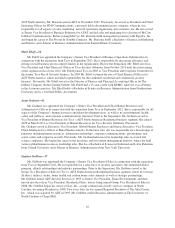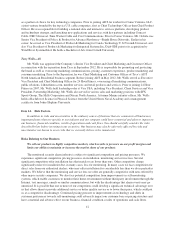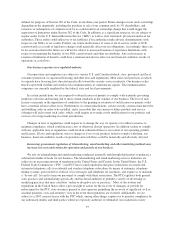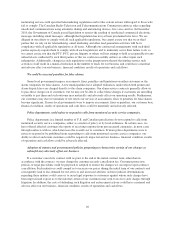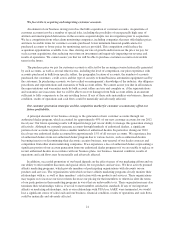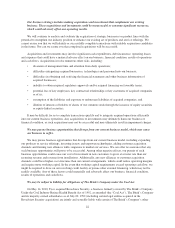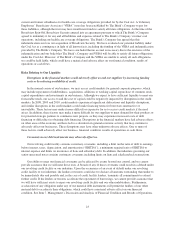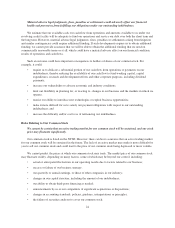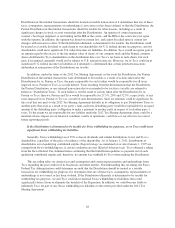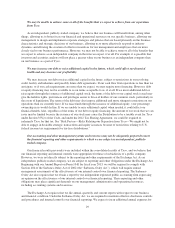ADT 2012 Annual Report Download - page 112
Download and view the complete annual report
Please find page 112 of the 2012 ADT annual report below. You can navigate through the pages in the report by either clicking on the pages listed below, or by using the keyword search tool below to find specific information within the annual report.monitoring services with specified telemarketing regulations and to take certain actions with regard to those who
fail to comply. The Canadian Radio-Television and Telecommunications Commission enforces rules regarding
unsolicited communications using automatic dialing and announcing devices, live voice and fax. In December
2010, the Government of Canada passed legislation to restrict the sending of unsolicited commercial electronic
messages including email messages, although that legislation has not yet been proclaimed into force. We are
diligent in our efforts to comply with all such applicable regulations, but cannot assure you that we or third
parties that we rely on for telemarketing, email marketing and other lead generation activities will be in
compliance with all applicable regulations at all times. Although our contractual arrangements with such third
parties expressly require them to comply with all such regulations and to indemnify us for their failure to do so,
we cannot assure you that the FTC, FCC, private litigants or others will not attempt to hold us responsible for any
unlawful acts conducted by such third parties or that we could successfully enforce or collect upon such
indemnities. Additionally, changes in such regulations or the interpretation thereof that further restrict such
activities could result in a material reduction in the number of leads for our business and could have a material
and adverse effect on our business, financial condition, results of operations and cash flows.
We could be assessed penalties for false alarms.
Some local governments impose assessments, fines, penalties and limitations on either customers or the
alarm companies for false alarms. A few municipalities have adopted ordinances under which both permit and
alarm dispatch fees are charged directly to the alarm companies. Our alarm service contracts generally allow us
to pass these charges on to customers, but we may not be able to collect these charges if customers are unwilling
or unable to pay them and such outcome may materially and adversely affect our operating results. Furthermore,
our customers may elect to terminate or not renew our services if assessments, fines or penalties for false alarms
become significant. If more local governments were to impose assessments, fines or penalties, our customer base,
financial condition, results of operations and cash flows could be materially and adversely affected.
Police departments could refuse to respond to calls from monitored security service companies.
Police departments in a limited number of U.S. and Canadian jurisdictions do not respond to calls from
monitored security service companies, either as a matter of policy or by local ordinance. In certain cases, we
have offered affected customers the option of receiving response from private guard companies, in most cases
through contracts with us, which increases the overall cost to customers. If more police departments were to
refuse to respond or be prohibited from responding to calls from monitored security service companies, our
ability to attract and retain customers could be negatively impacted and our business, financial condition, results
of operations and cash flows could be adversely affected.
Adoption of statutes and governmental policies purporting to characterize certain of our charges as
unlawful may adversely affect our business.
If a customer cancels its contract with us prior to the end of the initial contract term, other than in
accordance with the contract, we may charge the customer an early cancellation fee. Consumer protection
policies or legal precedents could be proposed or adopted to restrict the charges we can impose upon contract
cancellation. Such initiatives could compel us to increase our prices during the initial term of our contracts and
consequently lead to less demand for our services and increased attrition. Adverse judicial determinations
regarding these matters could cause us to incur legal exposure to customers against whom such charges have
been imposed and expose us to the risk that certain of our customers may seek to recover such charges through
litigation. In addition, the costs of defending such litigation and enforcement actions could have a material and
adverse effect on our business, financial condition, results of operations and cash flows.
20


